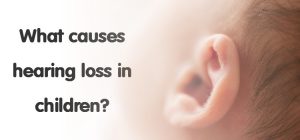
Early identification is crucial!
Hearing loss in infancy can be difficult to recognize. A majority of the time parents are the first to suspect hearing loss.
Hence, early screening and paying attention to the child’s general behavior and responses is important in order to start treatment as early as possible. Children as young as age 4 weeks can benefit from a hearing aid.
Hearing loss can be inherited or can occur as a result of an injury or an illness. Approximately 3-4 children in every 1,000 newborns have hearing impairments.
In the genes
Genetic factors give rise to 50% of all cases of congenital hearing loss.
The genetic influence does not necessarily mean that either one or both parents of a hearing-impaired child will also be hearing impaired. In 90% of children, who are born with congenital hearing loss, the parents can hear very well, but they have been carriers of recessive genes, which have been passed onto their children.
There are also another 20-30% of cases, where the cause of hearing impairment is unknown.
Prenatal Illnesses
Infections during pregnancy, such as rubella, cytomegalovirus, herpes or syphilis, and toxins consumed by the mother during pregnancy or other conditions occurring at the time of birth or shortly thereafter can give rise to 5%-15% of congenital hearing-loss cases. Premature birth also increases the risks of being deaf.
Postnatal causes
Infections during childhood, such as meningitis, measles or chicken pox, and trauma to the head can cause permanent hearing loss. Antibiotics such as streptomycin and related drugs can also have an influence on hearing problems. Ear infections can cause temporary hearing loss or lead to a permanent hearing impairment if not treated.
Post-natal causes account for 10-20% of hearing loss.

